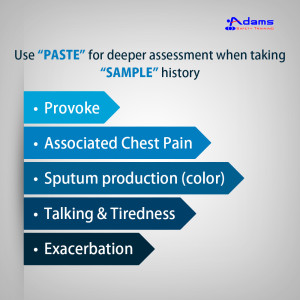“SAMPLE” is a first aid mnemonic acronym used for a person’s medical assessment. The SAMPLE history taking is either performed by emergency medical technicians (EMT) or first responders during an emergency. The questions that are asked to the patient include Signs & Symptoms, Allergies, Medications, Past medical history, Last oral intake, and Events leading up to present injury (SAMPLE).
The signs and symptoms assessment is very important, especially during respiratory emergencies, but they are objective. So “PASTE” can be used by the rescuer to gather relevant information about the patient’s health. This is an alternate mnemonic for evaluating a patient having difficulty in breathing. PASTE stands for:
• Provoke: Find out whether any external factor such as movement is making the situation better or worse.
• Associated Chest Pain: This will elicit descriptions of the patient’s pain in and around chest area.
• Sputum production (color): Is the patient coughing up sputum. Mucus-like sputum can be an indication of infection or any problem in respiratory system.
• Talking & Tiredness: Is the patient talking with you? Is he/she feeling tired? If the patient is not talking or responding to your voice, perform CPR immediately.
• Exacerbation: Check whether the condition of the patient is worsening with time.
Usually, OPQRST (Onset, Provocation, Quality, Radiation, Severity, and Time) acronym is used in lieu with SAMPLE for taking history of an injured person. However, this can be modified for a specific assessment of a patient with a complaint of shortness of breath. PASTE history taking proves to be beneficial in saving life of a person during respiratory emergencies. Such emergency mnemonics are being taught in first aid training classes so that EMTs and first responders can better assess the patient’s condition.


